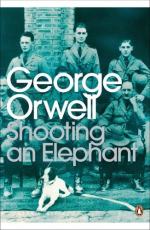
|
| Name: _________________________ | Period: ___________________ |
This test consists of 15 multiple choice questions and 5 short answer questions.
Multiple Choice Questions
1. What is the best motive for a compelling murder mystery, according to Orwell?
(a) Lust or power.
(b) Revenge.
(c) Money.
(d) Love.
2. According to Orwell, what flaw is shared by all of the titles he mentions in Chapter 16?
(a) A boring plot.
(b) Poor writing skill.
(c) Unmemorable characters.
(d) A kind of absurdity.
3. According to Orwell, spring is more noticeable for people in what areas?
(a) Urban.
(b) Rural.
(c) Suburban.
(d) Rural and urban.
4. How does Orwell feel about the quality of contemporary murder literature?
(a) It is poor.
(b) It is good.
(c) It is poor, but improving.
(d) It is good, but declining.
5. How does Orwell feel about books?
(a) He prefers reading to most activities, but understands why other people might not.
(b) He laments the prioritization of the people who don't read.
(c) He prefers movies, unless he finds a really good book that can be read again and again.
(d) He enjoys reading, but wishes that books were cheaper.
6. The murderer, according to Orwell, kills his victim to avoid what?
(a) Imprisonment.
(b) Financial ruin.
(c) Divorce.
(d) Disgrace or scandal.
7. What does Orwell compare athletes to?
(a) Machines.
(b) Soldiers.
(c) Chess pieces.
(d) Automobiles.
8. How much did it cost to plant the garden Orwell describes in Chapter 13?
(a) Twelve and sixpence.
(b) Six and sixpence.
(c) Two pounds.
(d) Three shillings.
9. How many reviews does the person in Chapter 14 write per year?
(a) 24.
(b) 12.
(c) 52.
(d) 100.
10. According to Orwell, what are the feelings between two teams in a sporting event?
(a) Friendliness.
(b) Hospitality.
(c) Ill-will.
(d) Sportsmanship.
11. In "Good Bad Books", what kind of books does Orwell write about?
(a) Books that are well written, and underappreciated by critics.
(b) Books that survive the test of time, but aren't necessarily "good" books.
(c) Books that aren't well written, but are popular because their authors are well known.
(d) Books that are good, but obscene.
12. What does Orwell cite as a reason for the quality of contemporary murder literature?
(a) There are currently no good writers.
(b) The government is censoring it too much.
(c) People aren't interested in reading it.
(d) Crimes are becoming less memorable.
13. What is the first poem Orwell mentions in Chapter 17?
(a) "The Owl and the Pussycat".
(b) "Humpty Dumpty".
(c) "Solomon Grundy".
(d) "Hey Diddle Diddle".
14. Which of these is NOT one of the books Orwell names as a "good bad book"?
(a) Harriet Beecher Stowe's "Uncle Tom's Cabin".
(b) Bram Stoker's "Dracula".
(c) Sir Arthur Conan Doyle's "Sherlock Holmes".
(d) Thomas Hardy's "The Return of the Native".
15. What does Orwell say about the meaning of the poems he mentions in Chapter 17?
(a) They mean very little.
(b) They mean something different to each person who reads them.
(c) They have profound meaning, though disguised.
(d) They have no meaning.
Short Answer Questions
1. What do Orwell's readers think Orwell should be focusing on?
2. Which title, named in Chapter 16, is also the subject of Chapter 18?
3. How many works is the person in Chapter 14 attempting to review?
4. What does "Helen's Babies" say about America, according to Orwell?
5. Orwell refers to the art of which countries to prove that those who work outdoors are interested in nature?
|
This section contains 545 words (approx. 2 pages at 300 words per page) |

|




